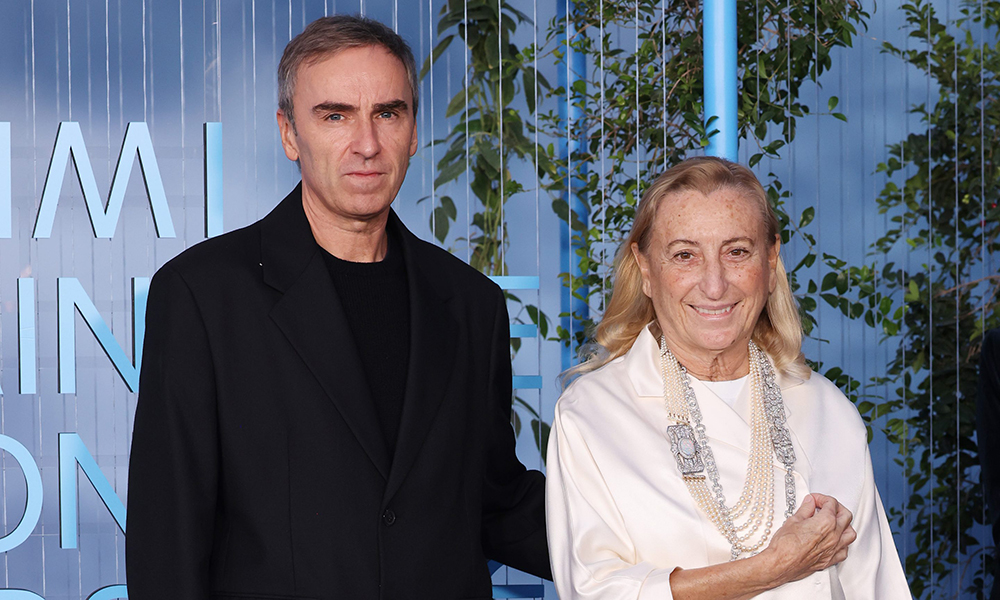
Z世代經(jīng)常遭到抨擊,,這已不是什么秘密,,最近有人批評他們是最難相處的一代人,在成長過程中卻獲得了太多獎勵,。但普拉達(dá)(Prada)的老板們不這么認(rèn)為,。
相反,普拉達(dá)聯(lián)合創(chuàng)意設(shè)計師繆西婭·普拉達(dá)和拉夫·西蒙斯希望利用這些年輕人的聰明才智,。
普拉達(dá)最近在米蘭舉行了男裝秀,。身為嬰兒潮一代的普拉達(dá)在后臺對《衛(wèi)報》表示:“青春就是未來,是希望?!?
她在提到公司的新系列產(chǎn)品時表示:“在目前這個糟糕的時代,,我們希望做一些能夠表達(dá)年輕人的樂觀主義精神的設(shè)計?!?/p>
西蒙斯于2020年加入普拉達(dá),,擔(dān)任該品牌的聯(lián)合創(chuàng)意總監(jiān)。他補(bǔ)充說,,在創(chuàng)作這個系列時,,兩人“想用年輕人的新鮮思維來思考”。
56歲的西蒙斯表示:“有時候,,年紀(jì)大了就會想得太多,,變得束手束腳。年輕的時候,,你可以隨心所欲,。我們喜歡這種精神?!?/p>
年輕人的頭腦真的更聰明嗎,?
普拉達(dá)和西蒙斯并不是第一批希望捕捉年輕人創(chuàng)造力的領(lǐng)導(dǎo)者。
在The Body Shop公司,,董事會邀請Z世代與管理層分享他們靈光一閃的時刻,,為正在進(jìn)行的項目獻(xiàn)計獻(xiàn)策,更重要的是,,讓品牌吸引下一代顧客,。
但不要指望由聰明的年輕人組成的影子董事會會自動轉(zhuǎn)化為新穎的想法;創(chuàng)造力與年齡之間充其量只能說存在微弱的聯(lián)系,。
研究表明,,我們的創(chuàng)造力高峰期其實(shí)是在40歲左右,而不是20多歲,,因為隨著年齡的增長,,我們將有豐富多彩,、富有啟發(fā)性的人生經(jīng)歷,,之后我們的認(rèn)知能力會開始衰退。
更重要的是,,與剛步入職場的人相比,,工作年限較長的人更有可能擁有資歷、自信和果斷,,來挑戰(zhàn)現(xiàn)狀并分享他們的奇思妙想,。
Z世代的新時代思維讓他們名聲不佳
雖然一些領(lǐng)導(dǎo)者顯然看重Z世代與眾不同的思維能力,但這也正是這種能力讓他們被貼上了難以相處的同事這樣的標(biāo)簽。
來自Resume Genius的最新研究表明,,45%的雇主認(rèn)為Z世代是最難相處的一代,,50%的Z世代招聘經(jīng)理認(rèn)同這種觀點(diǎn)。
如今,,年輕上班族想要的不僅僅是一份薪水(具體來說,,他們想要有意義的工作,要有可持續(xù)發(fā)展政策和明確的界限),,而且研究表明,,為了加入符合其價值觀的公司,他們甚至寧愿選擇更低的收入,。
除了對管理層來說是個后勤噩夢之外,,這并不一定是件壞事:員工的壓力和倦怠感正在迅速上升,而傳統(tǒng)工作規(guī)范依舊嚴(yán)重不利于職場媽媽,,因此,,讓這一代人堅定地重新想象他們的工作方式,可能對所有人都有好處,。
Resume Genius公司高級招聘經(jīng)理杰弗里·斯科特寫道:“Z世代已經(jīng)帶來了沖擊,,但他們并非要搞破壞:他們兼具獨(dú)特的才能和大膽的想法,能夠讓任何團(tuán)隊重新煥發(fā)活力,?!?/p>
例如,研究顯示,,Z世代管理者們在作出招聘決定時,,最有可能參考求職者在簡歷上填寫的“興趣愛好”,而不是專業(yè)經(jīng)驗,。
斯科特總結(jié)說:“Z世代可能名聲不佳,,但他們有能力讓工作場所變得更好?!保ㄘ敻恢形木W(wǎng))
翻譯:劉進(jìn)龍
審校:汪皓
Z世代經(jīng)常遭到抨擊,,這已不是什么秘密,最近有人批評他們是最難相處的一代人,,在成長過程中卻獲得了太多獎勵,。但普拉達(dá)(Prada)的老板們不這么認(rèn)為。
相反,,普拉達(dá)聯(lián)合創(chuàng)意設(shè)計師繆西婭·普拉達(dá)和拉夫·西蒙斯希望利用這些年輕人的聰明才智,。
普拉達(dá)最近在米蘭舉行了男裝秀。身為嬰兒潮一代的普拉達(dá)在后臺對《衛(wèi)報》表示:“青春就是未來,,是希望,?!?
她在提到公司的新系列產(chǎn)品時表示:“在目前這個糟糕的時代,我們希望做一些能夠表達(dá)年輕人的樂觀主義精神的設(shè)計,?!?/p>
西蒙斯于2020年加入普拉達(dá),擔(dān)任該品牌的聯(lián)合創(chuàng)意總監(jiān),。他補(bǔ)充說,,在創(chuàng)作這個系列時,兩人“想用年輕人的新鮮思維來思考”,。
56歲的西蒙斯表示:“有時候,,年紀(jì)大了就會想得太多,變得束手束腳,。年輕的時候,,你可以隨心所欲。我們喜歡這種精神,?!?/p>
年輕人的頭腦真的更聰明嗎?
普拉達(dá)和西蒙斯并不是第一批希望捕捉年輕人創(chuàng)造力的領(lǐng)導(dǎo)者,。
在The Body Shop公司,,董事會邀請Z世代與管理層分享他們靈光一閃的時刻,為正在進(jìn)行的項目獻(xiàn)計獻(xiàn)策,,更重要的是,,讓品牌吸引下一代顧客。
但不要指望由聰明的年輕人組成的影子董事會會自動轉(zhuǎn)化為新穎的想法,;創(chuàng)造力與年齡之間充其量只能說存在微弱的聯(lián)系,。
研究表明,我們的創(chuàng)造力高峰期其實(shí)是在40歲左右,,而不是20多歲,,因為隨著年齡的增長,我們將有豐富多彩,、富有啟發(fā)性的人生經(jīng)歷,,之后我們的認(rèn)知能力會開始衰退。
更重要的是,,與剛步入職場的人相比,,工作年限較長的人更有可能擁有資歷、自信和果斷,,來挑戰(zhàn)現(xiàn)狀并分享他們的奇思妙想,。
Z世代的新時代思維讓他們名聲不佳
雖然一些領(lǐng)導(dǎo)者顯然看重Z世代與眾不同的思維能力,,但這也正是這種能力讓他們被貼上了難以相處的同事這樣的標(biāo)簽,。
來自Resume Genius的最新研究表明,45%的雇主認(rèn)為Z世代是最難相處的一代,50%的Z世代招聘經(jīng)理認(rèn)同這種觀點(diǎn),。
如今,,年輕上班族想要的不僅僅是一份薪水(具體來說,他們想要有意義的工作,,要有可持續(xù)發(fā)展政策和明確的界限),,而且研究表明,為了加入符合其價值觀的公司,,他們甚至寧愿選擇更低的收入,。
除了對管理層來說是個后勤噩夢之外,這并不一定是件壞事:員工的壓力和倦怠感正在迅速上升,,而傳統(tǒng)工作規(guī)范依舊嚴(yán)重不利于職場媽媽,,因此,讓這一代人堅定地重新想象他們的工作方式,,可能對所有人都有好處,。
Resume Genius公司高級招聘經(jīng)理杰弗里·斯科特寫道:“Z世代已經(jīng)帶來了沖擊,但他們并非要搞破壞:他們兼具獨(dú)特的才能和大膽的想法,,能夠讓任何團(tuán)隊重新煥發(fā)活力,。”
例如,,研究顯示,,Z世代管理者們在作出招聘決定時,最有可能參考求職者在簡歷上填寫的“興趣愛好”,,而不是專業(yè)經(jīng)驗,。
斯科特總結(jié)說:“Z世代可能名聲不佳,但他們有能力讓工作場所變得更好,?!保ㄘ敻恢形木W(wǎng))
翻譯:劉進(jìn)龍
審校:汪皓
It’s no secret that Gen Z often gets flak, with new criticisms including that they’re the hardest generation to work with and got too many trophies growing up. But the bosses at Prada disagree.
Instead, co-creative designers Miuccia Prada and Raf Simons want to harness the bright minds of tomorrow.
“Youth is the future. It is hope,” Prada, a baby boomer, told The Guardian backstage at their recent menswear show in Milan.
“We wanted to do something that would express youthful optimism because the times are so bad,” Prada said of their new collection.
Simons, who joined Prada as co-creative director of the brand in 2020, added that when they were creating the collection, the duo “wanted to think like the fresh minds of the youth.”
“Sometimes, when you get older, you overthink and limit yourself,” the 56-year-old said. “When you are young, you just go. And we like that spirit.”
Are young minds really brighter?
Prada and Simons aren’t the first leaders to want to bottle the creativity of youngsters.
At The Body Shop, Gen Zers have been invited to the board room to share their light bulb moments with management, give input on projects in the works, and, crucially, make the brand attractive to the next generation of customers.
But don’t expect a shadow board of bright young minds to automatically translate to bright new ideas; the link between creativity and age is tenuous at best.
Research has shown that we actually hit our creative peak at around 40 years old—not in our 20s—because as we age, we have colorful and inspiring experiences before cognitive decline starts to creep in.
What’s more, those with more working years behind them are more likely to have the seniority, confidence, and assertiveness to challenge the status quo and share their outlandish innovations than those just starting out in their careers.
Gen Z’s new age thinking is what’s got them a bad rep
While some leaders clearly value Gen Z’s ability to think differently from the herd—it’s also exactly why they’re being labeled as challenging colleagues.
Recent research from Resume Genius highlighted that 45% of employers find Gen Z the most difficult generation to work with, with 50% of Gen Z hiring managers agreeing with the sentiment.
Today, young workers want more than a paycheck (specifically, meaningful jobs with sustainability policies and clear boundaries) and studies show that they are even willing to earn less to join a business that matches their values.
But—aside from being a logistic nightmare for management—that isn’t necessarily a bad thing: With employee stress and burnout rapidly on the rise and mothers still heavily penalized by traditional working norms, having a generation that’s dead set on reimagining how they work may benefit everyone.
“Gen Z has already shaken things up, but they’re not here to break things: They bring a unique blend of talent and bold ideas that can rejuvenate any workforce,” wrote Geoffrey Scott, senior hiring manager at Resume Genius.
For example, according to the research, Gen Z managers are most likely to make hiring decisions based on what candidates put down as their “hobbies and interests” on their CV, over professional experience.
“Gen Zers might have a bad rep, but they have the power to transform workplaces for the better,” Scott concluded.






